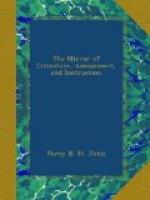In spite of its frequent partitions, the Holy Cross, say the monkish writers, thus remained undiminished at Jerusalem, receiving the homage of innumerable pilgrims, until the year 614, when that city was besieged and taken by the Persians. Their barbarous fanaticism reduced to ruins or burnt to the ground nearly all the sacred buildings, and made a great slaughter of the Christians, in which they are said to have been actively assisted by the resident Jews.[6] The bishop and the relic in question were removed into Persia, and continued in that country fourteen years, until the victories of the Emperor Heraclius led to an honourable peace, in which the restoration of this most precious treasure was expressly stipulated. During its captivity it had happily escaped the pollution of infidel hands; the case which contained it was brought back, unopened, to Jerusalem, and Heraclius himself undertook a journey in order to replace it in its former station on Mount Calvary. The prelude to this religious ceremony was a general massacre of the Jews, which the emperor had long withstood, but at length granted to the earnest and renewed entreaties of the monks of Alsik. The fact itself, and all its details, are so disgraceful to the parties concerned, that I would gladly reject it as false or overcharged, did it not rest on the authority of a patriarch of Alexandria.[7] Heraclius then, attended by a solemn procession, but laying aside his diadem and purple, bore the Cross on his own shoulders towards the holy sepulchre. An officer was appointed to its peculiar care, with the title of STAUROPHULAX;[8] and the anniversary of this event, the 14th September, is still celebrated in the Greek Church as a festival, under the name of the Exaltation of the Cross.
The relic did not long continue in the place to which the valour and piety of Heraclius had restored it, but was doomed to undergo still further vicissitudes of fortune. Only eight years afterwards (A.D. 636,) an army of Arabs, the new and fervent proselytes of Mahomet, invaded Palestine. At the battle of Yermuck, the imperial forces were totally routed, and Heraclius, downcast and dismayed, returned to Constantinople, bearing with him, as a source of consolation, the invaluable fragment, whose alleged miraculous powers were never exerted for its own protection.[9] It is rarely that, when a sovereign despairs of success, his subjects have the courage (it would, perhaps, be termed the disloyal presumption) to prolong their resistance; but the inhabitants of Jerusalem were animated by religious zeal and local associations, and did not, till after a doubtful siege of several months, yield the holy city to the Saracens. The event soon justified the prudent foresight of Heraclius in removing the Cross from the danger of Mahometan masters. The Caliph of Omar experienced some difficulties in the construction of a mosque at Jerusalem: he immediately supposed those difficulties to be supernatural,




